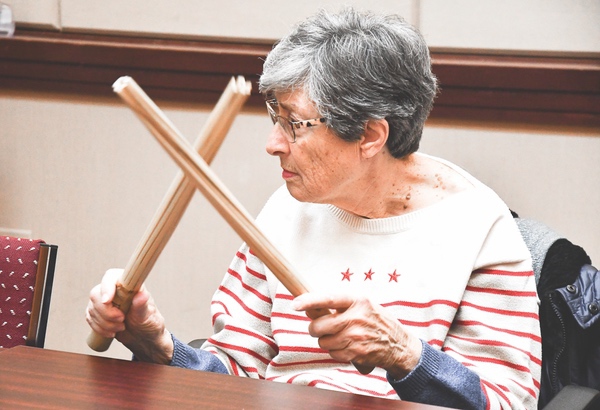Music therapy sessions are helping people with Parkinson’s disease, but how?
Music, particularly rhythm, can become a template for organizing a series of movements.
In Huntley, Brenda Buchanan facilitates a music therapy session twice a month. Buchanan is board certified as a music therapist. Group sessions are hosted at the Family Alliance, here in Huntley.

Parkinsons sufferer Betty Gaudio beats out a rhythm in a Rhythmic Auditory Stimulation exercise. (Photo by Christine Such/Sun Day)
“We are aiming to maintain and improve,” she said.
Betty Gaudi, a participant, said, “Brenda does it all. She sings, plays the guitar and gets us going.”
Buchanan explains, “We are using music as a tool to maintain function, voice, movement, balance, cognitive and fine motor skills.”
Al Mogilner states that he has, “Been here since the genesis of the program.”
The group consists of long-time members and first-time visitors. The group has sustains approximately 12 members currently. Buchanan states, “We have some snowbirds that are gone. We also have some support people that tag along with their friends or spouses.”
A little exercise is included in the session, to assist in balance and movement. Rhythmic auditory stimulation (RAS), such as playing marching music and following Buchanan’s directions, “move to the right and to the left” is a safe, inexpensive, and an effective method in improving movement and balance.
Participants in one exercise grabbed their instrument of choice, an egg shaker, drums, tambourine, sticks or a cabasa, to strike out on a beat the rhythm in an Eric Clapton song. A cabasa is a percussion instrument that is constructed with loops of steel ball chain wrapped around a wide cylinder.
Rhythm is important in Parkinson’s patient’s lives. In music therapy, rhythm can become a template for organizing a series of movements.
In another group exercise, the group took turns reading lines in a story. Buchanan stresses the importance of “Use expressions in our voices. This particular exercise builds strength in the vocal chords.”
Moving on through the session, Buchanan led the group in the song, Sentimental Journey, and encouraged, “Strong voices. Singing brings a smile to your face.”
Research has indicated that singing improves the muscles used for swallowing and respiratory control, two functions impacted by Parkinson’s.
As is the case with music in general, singing has numerous other health benefits on the brain. A common side effect for people with Parkinson’s is to have a shrinking voice, which can become softer over time. The singing helps.
Research in both music therapy and in neuroscience has shown that music can affect function in profound ways and have shown that certain types of music stimulate the production of dopamine and serotonin — two neurotransmitters (chemicals produced by brain cells) that are diminished in Parkinson’s Disease patients.
Anyone interested in attending the group or wanting more information can contact Family Alliance at 224-654-6300.




